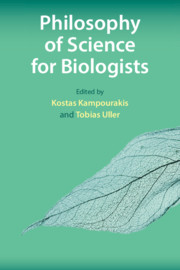Book contents
- Philosophy of Science for Biologists
- Philosophy of Science for Biologists
- Copyright page
- Contents
- Contributors
- Preface
- 1 Why Should Biologists Care about the Philosophy of Science?
- 2 What Constitutes an Explanation in Biology?
- 3 What Is Biological Knowledge?
- 4 What Is the Nature of Theories and Models in Biology?
- 5 How Are Biology Concepts Used and Transformed?
- 6 Why Does It Matter That Many Biology Concepts Are Metaphors?
- 7 How Do Concepts Contribute to Scientific Advancement?
- 8 How Can Conceptual Analysis Contribute to Scientific Practice?
- 9 What Methods Do Life Scientists Use?
- 10 Is It Possible to Scientifically Reconstruct the History of Life on Earth?
- 11 What Is the Basis of Biological Classification?
- 12 What Is the Nature of Scientific Controversies in the Biological Sciences?
- 13 What Is the Relation between Facts and Values in Biological Science?
- 14 A Philosopher in the Age of Creationism
- 15 How Can We Teach Philosophy of Science to Biologists?
- Further Reading
- Index
- References
3 - What Is Biological Knowledge?
Published online by Cambridge University Press: 04 September 2020
- Philosophy of Science for Biologists
- Philosophy of Science for Biologists
- Copyright page
- Contents
- Contributors
- Preface
- 1 Why Should Biologists Care about the Philosophy of Science?
- 2 What Constitutes an Explanation in Biology?
- 3 What Is Biological Knowledge?
- 4 What Is the Nature of Theories and Models in Biology?
- 5 How Are Biology Concepts Used and Transformed?
- 6 Why Does It Matter That Many Biology Concepts Are Metaphors?
- 7 How Do Concepts Contribute to Scientific Advancement?
- 8 How Can Conceptual Analysis Contribute to Scientific Practice?
- 9 What Methods Do Life Scientists Use?
- 10 Is It Possible to Scientifically Reconstruct the History of Life on Earth?
- 11 What Is the Basis of Biological Classification?
- 12 What Is the Nature of Scientific Controversies in the Biological Sciences?
- 13 What Is the Relation between Facts and Values in Biological Science?
- 14 A Philosopher in the Age of Creationism
- 15 How Can We Teach Philosophy of Science to Biologists?
- Further Reading
- Index
- References
Summary
As biologists can certainly appreciate, it can be helpful to think of biological knowledge as a species belonging to the genus knowledge. A good starting point for understanding the features of biological knowledge is therefore to ask what features all instances of knowledge have in common.
- Type
- Chapter
- Information
- Philosophy of Science for Biologists , pp. 36 - 54Publisher: Cambridge University PressPrint publication year: 2020
References
- 1
- Cited by

